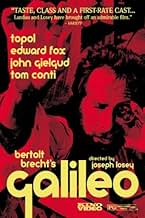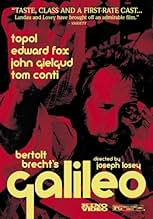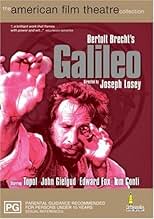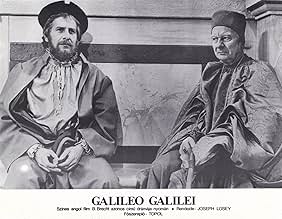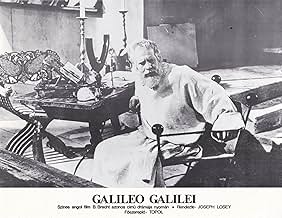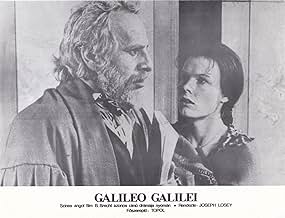Galileo Galilei, costruì uno dei primi telescopi e scoprì le lune di Giove. Sostenne la teoria eliocentrica, portando al suo processo da parte della Chiesa Cattolica. Ispirò altri a dimostra... Leggi tuttoGalileo Galilei, costruì uno dei primi telescopi e scoprì le lune di Giove. Sostenne la teoria eliocentrica, portando al suo processo da parte della Chiesa Cattolica. Ispirò altri a dimostrare che la Terra ruota attorno al Sole.Galileo Galilei, costruì uno dei primi telescopi e scoprì le lune di Giove. Sostenne la teoria eliocentrica, portando al suo processo da parte della Chiesa Cattolica. Ispirò altri a dimostrare che la Terra ruota attorno al Sole.
- Regia
- Sceneggiatura
- Star
Recensioni in evidenza
Galileo is portrayed as an opportunistic genius who is not above stealing someone else's invention and claiming it as his own if it will profit him. He is self-indulgent and corrupt, but he is still a scientist. When his theories of the nature of the universe conflict with the Church's, he recognizes that this may upset not only the way people view the sky, but their own own position in the constellation of their society. Galileo hopes to profit from this, to become a new high priest of science. But when threatened with torture by the Inquisition, a threat the Inquisitors know they dare not carry out because of Galileo's popularity, Galileo capitulates out of the fear of physical pain. His work is confiscated by the Church to be locked away from the people, his recantation is published and the incipient revolution he inspired dies away. Galileo is granted a small pension and forbidden to do any real scientific work.
Years later, Galileo is visited by a former assistant who tells him of the chilling effect his recantation had on scientific progress everywhere in Europe, that no one dares to express any dissident viewpoints. Galileo removes a copy of his scientific treatises from a hiding place and gives it to the assistant to smuggle out of the country. Galileo tells him he has spent many years secretly reconstructing his findings, waiting for someone to give them to. The assistant's tone instantly changes and he lauds Galileo for surviving the Inquisition so his work would not be lost. But Galileo refuses to accept these congratulations and condemns his recanting of the truths he had discovered. He says he knows now that he was never truly in danger and that his personal cowardice led to the continuation of oppressions of all kinds in society as well as the corruption of scientific discovery. He wonders what he and others scientists might have accomplished for the good of all if only he had stood up for the truth when he had the chance to do so. As the assistant leaves with the treatises, Galileo cautions him not to tell anyone where he got them. Galileo still fears reprisals from the powers that be and the loss of his minimal comforts. "...Your cheering at some new achievement would be echoed by a universal howl of horror," Galileo tells his former assistant. "I have betrayed my profession. Any man who does what I have done must not be tolerated in the ranks of science." This all supports playwright Brecht's leftist views, of course, but also accurately reflects the ambivalence of many of the A-bomb scientists about their creation.
"Galileo" was made by the American Film Theatre, the brainchild of producer Ely Landau. The AFT films were shown only in selected movie theaters to audiences who paid a subscription fee for a series of 6 plays on film a year. The AFT series ran from 1973 to 1976. These films were not simply filmed stage productions, nor were they "Hollywoodized" to increase viewers. They used the text of the plays as written by their authors. However, they also used cinematic techniques (close-ups, pans, dolly shots, etc.) to focus the audience's attention on important characters' expressions, reactions and interactions with other characters.
Other plays in this series include "The Man in the Glass Booth", for which Maximilian Schell received a Best Actor Academy Award Nomination, Jean Genet's "The Maids" with Susanna York and Glenda Jackson (I think) an
Topol with his impatient manner of speech is somewhat insufferable as Galileo. But then, by all accounts, the real Galileo had a touch of arrogance in him and was not very likeable. This movie does not capture the horrors of pre-Industrial Europe, when religious authorities could inflict the most fiendish tortures on any victims they chose. This movie could have made a statement about religion run amok in the social milieu of the day. Instead, it is a bland film lacking dramatic tension. It is a movie adapted from a play and it shows. There is even a chorus of choirboys which is totally out of place. However, there are few bio-pics of great scientists, so this one is worth watching once.
The role of Galileo was played an interesting actor by the name of Topol. New to this generation's work, I wasn't sure who Topol was until I watched this film. For those of you who do not know, he is a mix between an insane street urchin and a bearded John Belushi. His actions in this film seemed random and rabid at the same time. I never knew what he was going to do or say next, half due to the poor quality in sound, but also because Topol never looked scripted. I guess this is a good thing because it gave some realism to the scene, but it destroyed his character. I kept seeing Galileo as insane instead of brilliant. I know some will argue that Galileo was insane, but when I read about him I just couldn't picture him as one of those screwball geniuses. I always felt he was the real deal, just misunderstood. Topol's delivery of Galileo is longwinded in the sense that he talks more about his actions than just doing them. There seemed to be a lot of this going around in the film, but I will get into that later. Honestly, I wasn't impressed with Topol's performance in this film. I need to see him in more before I make my final decision on his acting ability, but Galileo was not his cup of tea. Outside of Topol, I didn't care about any of the other characters or really fully understand who they were. The lack of character development (odd in a three hour film) and poor sound (outside of the singing kids) only pulled me further away from the rest of the cast. They were just not up to quality standards.
While researching this film, I read by another reviewer about the reasoning for the American Film Theater to make this style of movie. In the mid 70s the organization released several of their plays to the silver screen for their members. As a chance to capture more people to their plays, they offered these subscriptions with six tickets to other films that they had released. The strange aspect about these movies is that they are not filmed as if the actors are on a stage, nor do they carry a lavish budget. They use some fancy (for the time) camera work to highlight some emotions in the characters, but that is it. The rest is cheap and claustrophobic scenery that would immediately turn the novice moviegoer away. Perhaps during this era this was considered amazing cinematography and set design, but in my eyes it just seems shoddy and poor. For this film to work well there needed to be less conversation, more involvement by other characters, and less singing. I didn't see this film labeled as a musical (and I understand why the kids sang to help guide the audience throughout the film as in a play), so I didn't need the twenty minute sexually driven dance sequence in the middle. It was as if it was put in there for the men in the audience that had patiently been waiting through this film (forcing their eyes to remain open) as an added benefit. Suddenly everyone was awake, just in time for the second act. GRRRRRRR.
Overall, this film put me to sleep several times before it was over. It was not the biography I was hoping for on this acclaimed scientist. As a period piece film it failed and as a 'courtroom drama' it failed as well. The actors seemed like they were overacting for film because they were used to the theater productions. Infants did the camera work and the singing kids who introduced the scenes should have been put out of their misery. At least wait till someone has hit puberty to get them singing! Jeesh. If the American Theater wanted this to attract others to their productions, they should have filmed it on a stage, it would have created a better atmosphere and tone. Topol, I hope to see you in better down the road, but until then, stay far away from science.
Grade: * out of *****
This is like a play or at least a staged film. There are those three singing boys introducing each section. After all, it is based on a play. The story unfolds episodically in nature. Some of this may be educational. The general story is familiar to me. This British film is filled with solid actors, but the tension isn't very high.
Lo sapevi?
- QuizJoseph Losey had also directed the original Broadway production of "Galileo," 28 years previously.
- BlooperAfter the crier announces Galileo Galilei's recantation, a chessboard is seen on the left side of the screen: all the pieces are upright. As Galileo enters, a new shot shows that one of the pieces has been toppled. In the next shot, all the pieces are again upright (1:57:50-1:58:10).
- Citazioni
Andrea Sarti: [upon Galileo's recantation] Unhappy is the land that has no heroes.
Galileo Galilei: Incorrect. Unhappy is the land that *needs* a hero.
- ConnessioniFeatured in Zomergasten: Episodio #23.1 (2010)
I più visti
- How long is Galileo?Powered by Alexa
Dettagli
- Data di uscita
- Paesi di origine
- Lingua
- Celebre anche come
- Galileo Galilei
- Luoghi delle riprese
- Aziende produttrici
- Vedi altri crediti dell’azienda su IMDbPro
- Tempo di esecuzione2 ore 25 minuti
- Mix di suoni
- Proporzioni
- 1.85 : 1
Contribuisci a questa pagina



